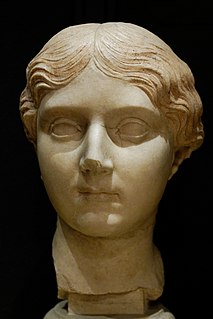Related Research Articles

Antonia the Elder was a niece of the first Roman emperor Augustus, being the eldest daughter of Octavia the Younger and her second husband the Triumvir Mark Antony. She married Lucius Domitius Ahenobarbus and became the paternal grandmother of the emperor Nero.
Cornelia was the daughter of Scribonia and her second husband. She was stepdaughter to Octavian through her mother's third marriage and half-sister to Julia the Elder, Augustus' only biological child.

The gens Cornelia was one of the greatest patrician houses at ancient Rome. For more than seven hundred years, from the early decades of the Republic to the third century AD, the Cornelii produced more eminent statesmen and generals than any other gens. At least seventy-five consuls under the Republic were members of this family, beginning with Servius Cornelius Maluginensis in 485 BC. Together with the Aemilii, Claudii, Fabii, Manlii, and Valerii, the Cornelii were almost certainly numbered among the gentes maiores, the most important and powerful families of Rome, who for centuries dominated the Republican magistracies. All of the major branches of the Cornelian gens were patrician, but there were also plebeian Cornelii, at least some of whom were descended from freedmen.
Publius Cornelius Scipio was a Roman senator active during the Principate. He was consul in 16 BC as the colleague of Lucius Domitius Ahenobarbus. He was also proconsular governor of Asia, probably around the years 8/7 BC.
Gnaeus Cornelius Lentulus Marcellinus was a Roman statesman and consul of 56 BC. He was married at least twice. His first wife is unknown but his second wife was probably Scribonia, at least twenty years his junior, who later became the second wife of Augustus.
Gnaeus Cornelius Lentulus Gaetulicus was a Roman senator and general. He was ordinary consul in the year 26 with Gaius Calvisius Sabinus as his colleague. Gaetulicus was involved in a plot against the emperor Caligula, and following its discovery he was executed.

Lucius Volusius Saturninus was a Roman senator who held several offices in the emperor's service. Saturninus attracted the attention of his contemporaries for his long life: he died at the age of 93, and having sired a son at the age of 62.
Faustus Cornelius Sulla was a Roman senator who lived during the reign of the emperor Tiberius. He was suffect consul in AD 31 with Sextus Tedius Valerius Catullus as his colleague. Faustus was the son of Sulla Felix, a member of the Arval Brethren who died in AD 21, thus a direct descendant of the dictator Sulla. His mother was Sextia and his brother was Lucius Cornelius Sulla Felix.
Publius Cornelius Lentulus Scipio was a Roman senator active during the Principate. He was suffect consul in the nundinium of July-December AD 24, as the colleague of Gaius Calpurnius Aviola. His name combines the two most famous branches of the gens Cornelia, the Lentuli and the Scipiones.
The gens Appuleia, occasionally written Apuleia, was a plebeian family at ancient Rome, which flourished from the fifth century BC into imperial times. The first of the gens to achieve importance was Lucius Appuleius, tribune of the plebs in 391 BC.
Gaius Calvisius Sabinus was a consul of the Roman Republic in 39 BC under the Second Triumvirate. He and his consular colleague Lucius Marcius Censorinus had been the only two senators who tried to defend Julius Caesar when his assassins struck on 15 March 44 BC, and their consulship under the triumvirate is taken as a recognition of their loyalty. An inscription, described by Ronald Syme as "one of the most remarkable inscriptions ever set up in honour of a Roman senator," praises Calvisius for pietas, his sense of duty or devotion. As a military officer, Calvisius is notable for his long service and competence, though he was not without serious defeats.
Lucius Nonius Asprenas was a Roman politician and general who fought with Julius Caesar and was elected consul suffectus in 36 BC.
Appius Claudius Pulcher was a Roman politician. An early supporter of Augustus, he was elected consul in 38 BC.

Lucius Marcius Philippus was a Roman politician who was elected suffect consul in 38 BC. He was step-brother to the future emperor Augustus.
Lucius Cornelius Lentulus was a Roman politician and military officer who served as consul in 3 BC.
Lucius Autronius Paetus was a Roman senator who was appointed suffect consul in 33 BC.
Sextus Nonius Quinctilianus was a Roman Senator. He was appointed consul in AD 8 as the colleague of Marcus Furius Camillus.
Marcus Valerius Messalla was a Roman senator who was appointed suffect consul in 32 BC.
Publius Cornelius Lentulus Marcellinus was a Roman Senator who was elected Roman consul in 18 BC, with Gnaeus Cornelius Lentulus as his colleague. During his consulship, the Senate and the Roman assembly again conferred upon the Roman emperor Augustus his extraordinary promagisterial authority and his Tribunician power.
Lucius Vinicius was a Roman Senator who was appointed suffect consul in 33 BC.
References
- ↑ Ferriès, Marie-Claire, Les partisans d'Antoine: des orphelins de César aux complices de Cléopâtre (2007), pg. 505. Note that Ronald Syme rejected this association – see The Augustan Aristocracy (1986), pg. 286
- ↑ Syme, Ronald, The Augustan Aristocracy (1986), pg. 286
- ↑ Alexander, Michael C., Trials in the Late Roman Republic, 149 BC to 50 BC (1990), pg. 296
- ↑ Broughton, pg. 321
- ↑ Broughton, pg. 364
- ↑ Broughton, pg. 390